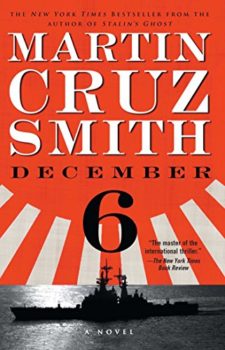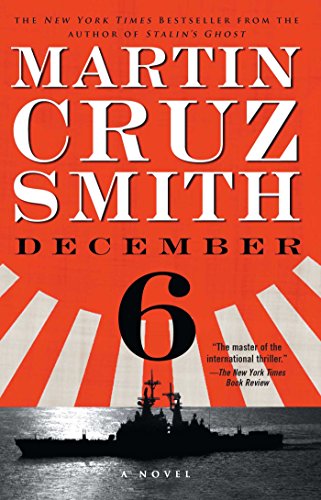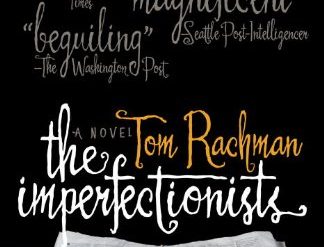
Martin Cruz Smith is best known for the eight bestselling novels (with the ninth now on the way) about police detective Arkady Renko in the USSR and, later, Russia. However, he has written nearly two dozen other books, including two other series of thrillers and a number of standalone novels. December 6 is one of the standalone efforts, and it’s a worthy one. It’s a thriller set in Imperial Japan.
Estimated reading time: 4 minutes
A talent for historical research
Smith’s Arkady Renko novels have attracted praise for the depth of his research. He won several literary awards for the books. And his talent for digging below the surface of the historical record shows brightly in December 6. The date, of course, is the day before Imperial Japan attacked the United States at Pearl Harbor, Hawaii, as 1941 drew to a close.
A thriller set in Imperial Japan on the eve of Pearl Harbor
Smith takes us behind the scenes in the repressive, militaristic society of the Empire of Japan through the eyes of an expatriate American named Harry Niles. Harry is the son of Protestant missionaries who left him largely on his own growing up in Tokyo. Rebelling against his rigid, clueless parents, Harry soon proved himself adept as a pickpocket, a conman, and a courier among underworld figures. Unlike his parents, he became bilingual in Japanese and came to know the complexities of Japanese society.
December 6 by Martin Cruz Smith (2001) 400 pages ★★★★☆
A con man enlisted to investigate fraud by the Allies
As the novel opens, Harry, now thirty years old, has become a wealthy businessman, largely through illegal activity. He owns a popular bar. Meanwhile, his boyhood friends have followed other paths: one is a rising officer in the Japanese navy, a second has become a yakuza, and a third, a sadistic bully, has become a sergeant in the army. These connections give Harry insight into the country’s preparation for war. And his friend Gen, the naval officer, enlists his help to investigate possible fraud by the American and British oil companies that have been caught up in the Allied blockade and oil embargo. (Japan had signed the Tripartite Pact with Nazi Germany and Fascist Italy in 1940.)
The US oil embargo was decisive
Many historians have asserted that the US oil embargo was the decisive measure that pushed Japan to war. By the end of 1941, the shortage of oil in the islands was so severe that private automobiles were running on charcoal. To compound the problem, the blockade had cut off food shipments. Millions were already suffering.
Americans tend to forget that by late 1941 Japan had already been at war in China for ten years, having invaded Manchuria in 1931. The infamous Rape of Nanking had taken place in 1937. And that event figures as a central element in Smith’s novel.
Two leading historical figures enter the tale
In the course of his investigation, Harry becomes acquainted with one of the central figures of the war: Admiral Isoroku Yamamoto. He has also come to know the prime minister, General Hideki Tojo, although from afar. Tojo merely makes a cameo appearance, but Harry’s interaction with the admiral is notable. Involving these two historical figures in this thriller set in Imperial Japan is a natural. It adds depth to the picture Smith paints of the nation as it set out to war.
For related reading
I’ve reviewed only two other books about Japan: Newcomer (Police Detective Kaga #7) by Keigo Higashino (A Japanese Sherlock Holmes and Harry Bosch rolled into one); and Japantown (Jim Brodie #1) by Barry Lancet (A thriller grounded in deep understanding of Japanese culture). I’ve also reviewed Three Stations (Arkady Renko #7) by Martin Cruz Smith at A look inside Russia under Putin.
However, I’ve read and reviewed a great deal about World War II. You’ll find many of these books in two grouped reviews:
If you enjoy reading history in fictional form, check out 20 most enlightening historical novels. And if you’re looking for exciting historical novels, check out Top 10 historical mysteries and thrillers.
And you can always find my most popular reviews, and the most recent ones, on the Home Page.



























